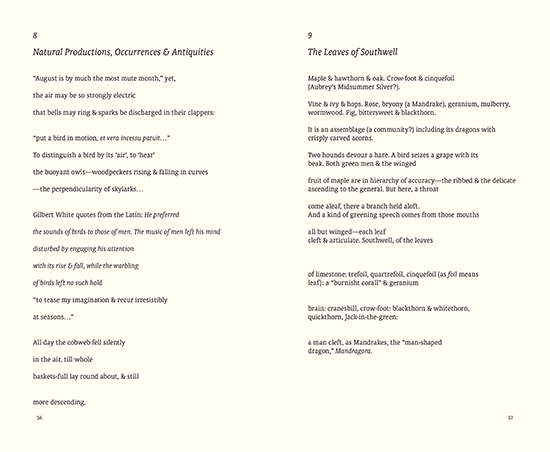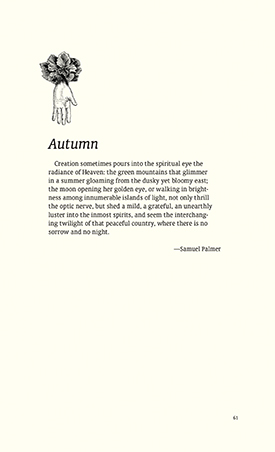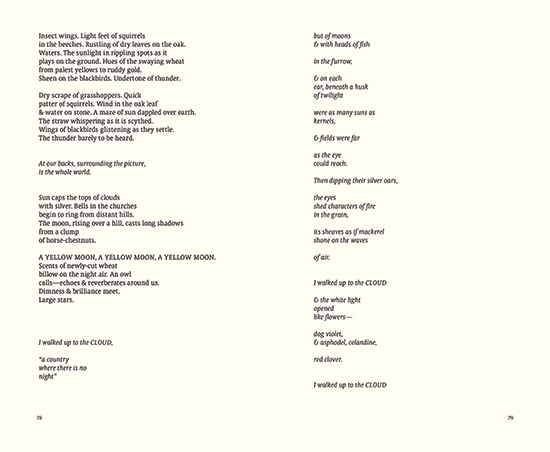The Book of the
Green Man
...............................................
Ronald Johnson
ISBN 978 1 910010 04 4
96pp, 234 x 142
sewn paperback with flaps
This first edition published 2015
Reprinted 2022
£10.00
Postage
UK £2.50
Europe £5.50
World £8.50
For more than one copy or to order multiple titles please email your order and we will calculate the postage cost.
Email Uniformbooks
Trade orders Central Books
Email Central Books
...............................................
Reviews and articles
“A revelation in waiting.”
—Tim Dee
‘The 10 best nature books’ in
The Observer 22 March 2015
“The Book of the Green Man is an important poem, a major long poem of the 1960s that has been out of print for far too long. Uniformbooks are to be commended for bringing it back into circulation in a format that is both handsome and serviceable.”
—Billy Mills
Elliptical Movements 9 June 2015


Ronald Johnson described The Book of the Green Man as his “attempt, as a brash American, to make new the traditional British long seasonal poem.” This Poundian endeavor to “make it new” stemmed from a visit that he and fellow poet Jonathan Williams made to the United Kingdom in the autumn of 1962, in search of all things “most rich, most glittering, most strange.”
The first edition of the poem, published in 1967, describes how The Book of the Green Man “encompasses a year, October to October: on foot for a month in the Lake Country; a walk in Spring from the mouth of the Wye, up its winding valley, to its source on Wales high on the flanks of Plynlimmon; and various excursions to gardens, follies and grottoes, to Gilbert White’s Selborne, and the carved foliage and green men of the Chapter House at Southwell Minster.”
Writing on the dustwrapper to the same edition, the distinguished poet and translator Christopher Middleton praised The Book of the Green Man “as a remarkable piece of work. The surprise is this: he presents an image of England, or, to be precise, of sundry English scenes, with a vividness and a strangeness beyond the reach of any English poet, and unknown, I venture to say, since the days of Blake, Calvert and Palmer. Ronald Johnson has unearthed an England which most people have forgotten… his observation is microscopic, but his sense of place drills through to the mythic substrata.”


This long-awaited new edition has an afterword by Ross Hair, Lecturer in American Studies at the University of East Anglia, and author of Ronald Johnson’s Modernist Collage Poetry.
...
Ronald Johnson was born on November 25, 1935 in Ashland, Kansas, a small town on the prairie about twenty miles north of the Oklahoma border. He briefly attended the University of Kansas, served in the U.S. Army for two years, and, on the G.I. Bill, attended Columbia University. In the company of Jonathan Williams, he spent the early sixties walking the length of the Appalachian Trail, as well as two years wandering around England, the experience of which formed the basis of The Book of the Green Man. In the late sixties and early seventies, Johnson was integrally involved with the international concrete poetry movement, closely affiliated with Ian Hamilton Finlay in Scotland, as well as Doyle Moore’s experimental press in Urbana, Illinois. At the same time, while living in San Francisco, he was expanding his work in the realm of projective verse and the New American idiom, publishing Radi os in 1977, his poem-by-excision of Milton’s Paradise Lost, a poem of enduring interest. During this period, Johnson began writing ARK, his masterpiece, a late entry into the annals of the modernist long poem. Work on ARK consumed Johnson’s imagination for more than twenty years. It was published in 1996. In the nineties, owing to health problems, he moved from San Francisco back to Kansas, to Topeka, where he wrote his final poetry, including The Shrubberies, which was published posthumously. Johnson died in Topeka on March 4, 1998.
